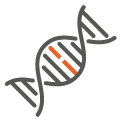Research
Our research is focused on the study of cancer from a genomics perspective. We are particularly interested in the identification of cancer driver mutations, genes and pathways across tumour types and in the study of the mutational processes across tissues and genomic regions.
Understanding Mutational Processes
Tumour genomes contain thousands of mutations, which can be identified by Next- Generation Sequencing technologies. By studying the observed pattern of these somatic mutations across genomic regions, we are able to explore the basic cell mechanisms that produce them. The interplay between these mechanisms, such as internal and external insults that damage DNA, chromosomal replication, transcription, and DNA repair mechanisms, leads to mutational processes that give rise to heterogeneous patterns of somatic mutations across the genome.
We have detected, for instance, discovered that the binding of transcription factors to their binding sites hinder the efficiency of nucleotide excision repair (NER), resulting in the generation of a greater number of mutations in the transcription factor binding site than in neighboring regions (Nature 2016). We also discovered that nucleosome covered DNA shows a 10 bp periodicity on the rate of somatic and germline mutations. This periodicity tracks DNA minor groove facing toward and away from the histones, and we propose that this has contributed to the AT/CG 10-bp periodicity in eukaryotic genomes (Cell 2018). We also study the mutational footprints of cancer therapies in patient’s tissues (Nature Genetics 2019, Cancer Discovery 2024).








